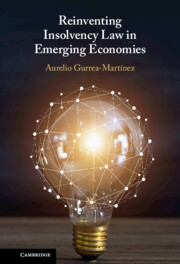Book contents
- Reinventing Insolvency Law in Emerging Economies
- Reinventing Insolvency Law in Emerging Economies
- Copyright page
- Dedication
- Contents
- Figures
- Tables
- Preface
- Acknowledgments
- Table of Cases
- Table of Legislation and Other Instruments
- Abbreviations
- Part I Foundations
- Part II Features and Challenges of Insolvency Law in Emerging Economies
- Part III Towards a New Insolvency Framework in Emerging Economies
- 4 Promotion of Workouts and Hybrid Procedures
- 5 Directors’ Duties in the Zone of Insolvency in Emerging Economies
- 6 Implementation of a Simplified Insolvency Framework for Micro- and Small Enterprises
- 7 Tweaking Ordinary Insolvency Proceedings
- 8 Favoring the Choice of Insolvency Forum
- Part IV The Future of Insolvency Law
- Glossary
- Index
8 - Favoring the Choice of Insolvency Forum
from Part III - Towards a New Insolvency Framework in Emerging Economies
Published online by Cambridge University Press: 06 June 2024
- Reinventing Insolvency Law in Emerging Economies
- Reinventing Insolvency Law in Emerging Economies
- Copyright page
- Dedication
- Contents
- Figures
- Tables
- Preface
- Acknowledgments
- Table of Cases
- Table of Legislation and Other Instruments
- Abbreviations
- Part I Foundations
- Part II Features and Challenges of Insolvency Law in Emerging Economies
- Part III Towards a New Insolvency Framework in Emerging Economies
- 4 Promotion of Workouts and Hybrid Procedures
- 5 Directors’ Duties in the Zone of Insolvency in Emerging Economies
- 6 Implementation of a Simplified Insolvency Framework for Micro- and Small Enterprises
- 7 Tweaking Ordinary Insolvency Proceedings
- 8 Favoring the Choice of Insolvency Forum
- Part IV The Future of Insolvency Law
- Glossary
- Index
Summary
This chapter argues that emerging economies – and more generally any jurisdiction – should facilitate the choice of insolvency forum. Consistently with a pioneering proposal suggested by Professor Rasmussen, it is argued that this choice of insolvency forum should be facilitated ex ante. Thus, in addition to providing a more desirable solution for debtors and creditors in the event of financial distress, the ex ante choice of insolvency forum would serve as a mechanism to facilitate firm’s access to finance and the promotion of economic growth. Alternatively, if the insolvency forum cannot be chosen ex ante, at least it should be facilitated ex post. Regardless of the solution eventually adopted, this chapter explains that this greater level of freedom for the choice of insolvency forum requires certain changes to the rules governing cross-border insolvency and particularly those established in the UNCITRAL Model Law on Cross-Border Insolvency. Moreover, it requires the adoption of certain rules to prevent debtors from opportunistically choosing or shifting the insolvency forum at the expense of the creditors.
Keywords
- Type
- Chapter
- Information
- Reinventing Insolvency Law in Emerging Economies , pp. 248 - 272Publisher: Cambridge University PressPrint publication year: 2024

